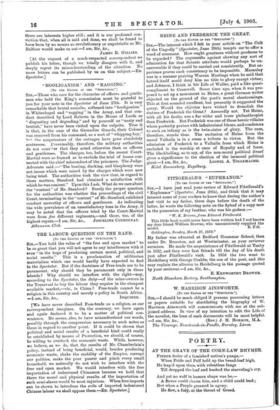HEINE AND FREDERICK THE GREAT.
LT0 THE EDITOR OP TEE "SPECTATOR."
Six,—The interest which I felt in your article on "The Cult of the Ungodly" (Spectator, June 20th) tempts me.to offer a word of comment. How ought greatness without goodness to be regarded? The arguments against showing any sort of admiration for that Satanic attribute would perhaps be un- answerable if they could be carried out consistently. But ex- perience proves such consistency to be impossible. Macaulay was in a manner praising Warren Hastings when he said that hatred itself could deny him no title to glory except virtue; and Johnson, I think in his Life of Waller, paid a like quasi. compliment, to Cromwell. Some time ago, when it was pro- posed to set up a monument to Heine, a great German writer objected on the ground of the poet's moral shortcomings. This at first sounded excellent, but presently it suggested the query, Would the objector have wished to demolish the statues of Frederick the Great? Assuredly not. Yet Heine, with all his faults, was a far wider and truer philanthropist than Frederick. But Frederick was one of those heroic villains whom posterity praises with infinitesimal blame, and condemns to such an infamy as is the twin-sister of glory. The case, therefore, stands thus. The exclusion of Heine from the moral Valhalla is in a sense a tribute to virtue. But the admission of Frederick to a Valhalla from which Heine is excluded is the worship at once of Royalty and of force. The blackballing, so to say, of the non-moral political dwarf gives a significance to the election of the immoral political










































 Previous page
Previous page